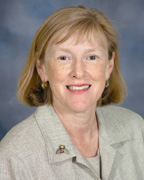 Ann Berger, Ph.D., UNMC College of Nursing associate professor of nursing, has been selected for a four-year appointment to the National Institutes of Health (NIH) Center for Scientific Review (CSR). Dr. Berger is assigned to the Nursing Science: Children and Families Study Section.
Ann Berger, Ph.D., UNMC College of Nursing associate professor of nursing, has been selected for a four-year appointment to the National Institutes of Health (NIH) Center for Scientific Review (CSR). Dr. Berger is assigned to the Nursing Science: Children and Families Study Section.
The NIH, one of the world’s foremost medical research centers, funds medical and health care research.
Dr. Berger’s charge is to review research grant applications for studies related to clinical nursing practice from preconception through adolescence, women’s health and health disparities. Her four-year commitment begins in October.
“It’s an honor and a big responsibility,” said Dr. Berger, whose area of expertise includes women with cancer, especially breast cancer; management of fatigue and other symptoms; and sleep disturbances.
Dr. Berger will review seven to nine grants each quarter and travel to Washington, D.C., three times a year to review grants that score in the top half. Prior to her travels, she will post her reviews electronically. It takes four to eight hours to review each grant application, she said.
“There’s a lot of information shared by the three reviewers before the final score is made,” Dr. Berger said. “Scores can change after discussion by the entire panel. Every grant proposal gets a very thorough and careful review.”
The NIH Center for Scientific Review, which manages the receipt and referral of all grant applications submitted to the NIH, received 64,187 applications for review in 2003. The CSR has about 220 chartered study sections and regularly recurring special emphasis panels which includes about 11,000 grant reviews a year. Each study section consists of 12 to 24 members, primarily from academia.
The most prestigious and well-funded of NIH grants is the R01 grant (Research Project — R01 grant). “When an R01 grant is funded, it speaks about its merit and ability to be competitive,” Dr. Berger said.
The NIH considers grant proposals on five major scoring criteria:
- significance — does the study address an important problem?;
- approach — are the conceptual framework, design, methods and analyses adequately developed, well-integrated and appropriate to the aims of the project?;
- innovation — does the project employ novel concepts, approaches or methods?;
- investigator — is the investigator appropriately trained and well-suited to carry out the work?; and
- environment — does the scientific environment in which the work will be done contribute to the probability of success?
Dr. Berger’s appointment also benefits UNMC. “It helps the college to have representatives at the NIH,” Dr. Berger said. “We can do better at advising other researchers how to prepare a grant that is more likely to get a good score and be funded.
“It’s a great opportunity to learn from research experts across the country and to socialize and talk with them on how to write a good grant. We have many things set up at the college to help faculty in their research.”
The UNMC College of Nursing, which currently ranks 21st in NIH nursing research rankings, has a five-year goal to be in the top 10.
There are more than 600 nursing baccalaureate or higher degree programs in the United States. In fiscal year 2000, the college first ranked in the top 90 nursing schools at 84th for NIH research funding. In FY 2001, the college moved up to 47th and in FY 2002 it ranked 21st.
“In addition to answering important scientific questions, grant money helps fund new faculty and equipment and expands the infrastructure. It’s what makes a university grow,” said Dr. Berger, who currently has research grants totaling $1.5 million.
An advanced practice oncology nurse, Dr. Berger has been involved in grant reviews since 2001 as a member of the UNMC Institutional Review Board (IRB). In February, she was chairwoman of the National Cancer Institute’s study sections on symptom management and palliative care.
Dr. Berger earned her bachelor’s degree in nursing in 1971 at the Creighton University School of Nursing, her master’s degree in nursing in 1984 from UNMC and her doctorate in nursing in 1996 from UNMC. In 1973, she accepted a position as nursing instructor with UNMC. From 1975 to 1981, she worked out-of-state, before returning to earn a master’s degree in nursing at UNMC. She became associate professor in 2001 and a Niedfelt Nursing Professor in 2005.